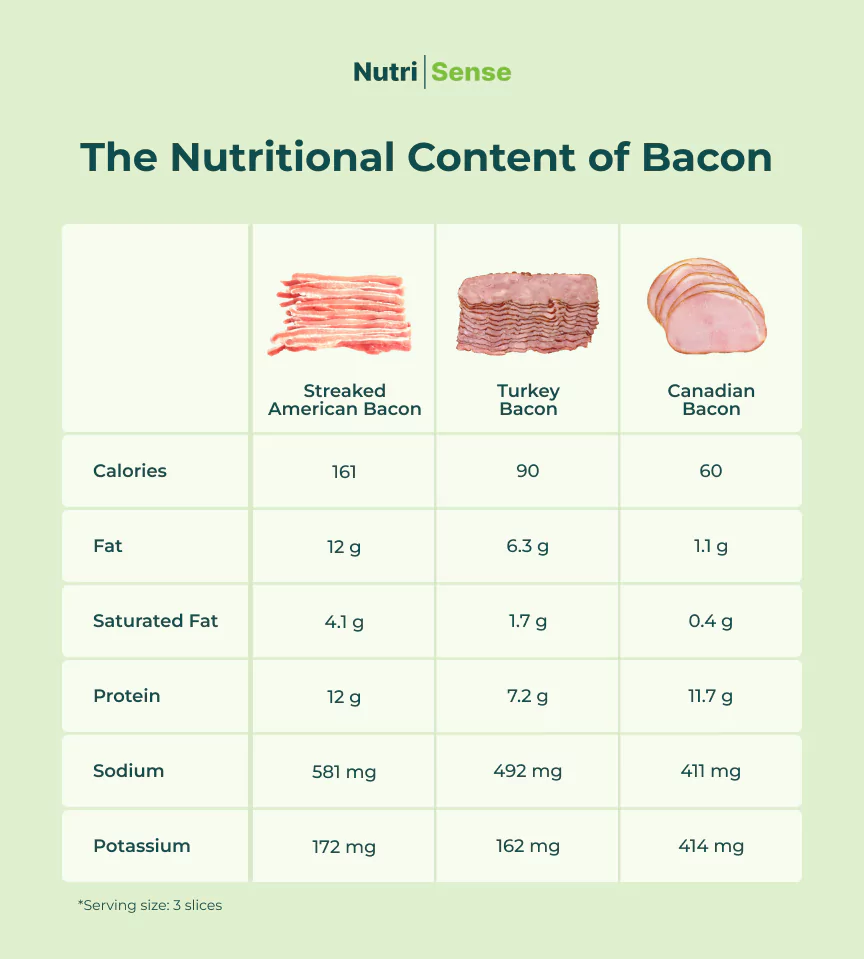Uncovering the Truth: Does Bacon Affect Your Blood Sugar?
.webp)
Key Takeways
Bacon is a delicious and versatile meat that pairs with everything from hamburgers to pancakes. Unfortunately, however, bacon doesn’t have the best reputation in the health world.
As a type of pork, bacon falls into the category of processed meat. While bacon is a high-protein food, it also tends to be high in sodium and saturated fat.But is bacon really as unhealthy as it’s rumored to be? Can bacon be part of a healthy diet, and does it affect blood sugar or insulin levels?
If you love to eat bacon and have ever wondered whether it has any health benefits (or why it gets a bad rep), keep on reading to find out!
Types of Bacon
There are many varieties of bacon that have slightly different nutritional profiles. While bacon can technically be made out of any kind of animal meat, traditional bacon comes from pork and is cured and smoked. Here are the most common varieties of bacon:
- Streaky bacon: This is the standard form of American bacon that comes from pork belly. This bacon is sold in straight or “streaky” slices at chain grocery stores and is a popular breakfast meat.
- Canadian bacon: Sold as round slices, this type of bacon comes from the pork loin. Canadian bacon contains more lean protein than streaky American bacon (and may have less fat).
- Turkey bacon: This type is a combination of dark and light turkey meat that’s been processed in strips to mimic traditional pork bacon. It may be lower in fat than other forms of bacon.
- Beef bacon: Similarly to pork bacon, beef bacon comes from the belly of a cow and is processed into slices.
- Pancetta: This type of meat is similar in taste to bacon and comes from Italy. Pancetta comes from pork belly but is not smoked, and it’s usually sold in a slab to be sliced. It’s a common ingredient in carbonara pasta dishes.
Does Bacon Have Health Benefits?

Protein is an essential macronutrient and has a number of health benefits like regulating satiety and hunger, supporting normal blood sugar levels, and boosting metabolism. As a type of processed red meat, bacon is a good source of protein.
Traditional American bacon also contains B vitamins, and minerals like iron, potassium, magnesium, and phosphorus. However, the levels of these nutrients is not very high compared to other types of meat.
While there are some potential health benefits that can come from bacon, it’s not surprising that it may contain other compounds that can negatively impact health. Let’s discuss some of the reasons why bacon has a reputation for being unhealthy.
Is Bacon Really That Bad for You?
So, why exactly does bacon have such a bad reputation if it’s just another type of pork? There are a few reasons why you may want to watch how much bacon you are consuming.
Bacon is a Processed Meat

The Dietary Guidelines for Americans recommend limiting your intake of processed meats. Some studies have shown that consuming processed meat such as bacon, sausage, or deli meats increased the risk of type 2 diabetes by up to 19 percent.
Bacon is a type of processed meat that often contains added nitrites and nitrates and other preservatives to maintain their taste and color. While nitrites and nitrates can occur naturally in some foods, some research has indicated a potential carcinogenic effect when they are added to processed meats.
The nitrites found in cured meats may also have negative impacts on lung health. Research shows that consumption of nitrites found in meats like bacon may worsen a lung condition called chronic obstructive pulmonary disease (COPD), especially in men and smokers.
Regular consumption of processed meat has also been linked to an increased risk of cardiovascular disease. Other studies have shown that consuming just one slice of bacon per day can increase your risk of developing colorectal cancer.
Saturated Fat and Sodium Content of Bacon
Since bacon is a cured meat, it is extremely high in sodium. Consuming high levels of sodium can impact blood pressure, increase your risk of heart disease, and potentially lead to hypertension.
High sodium diets have also been linked to an increased risk for obesity. Other research suggests that excessive sodium in your diet can cause insulin resistance, so it’s important to be mindful of your overall salt consumption.
Bacon is also a high-fat meat that contains a large amount of saturated fat, which may be linked to adverse health effects such as cholesterol levels. However, the negative effects of saturated fat are still being studied, and more research is needed to determine if high levels of saturated fat consumption lead to poor health outcomes.
The Nutritional Content of Bacon
With so many different varieties of bacon available, you may be wondering whether one type is healthier than the other. Let’s break down the nutritional content of a few of the most common types of bacon.

Does the Quality of Bacon Matter?
As with every food you eat, the quality of your cuts of meat is important. This helps ensure you’re getting as many nutrients from your food as possible and as little added chemicals or preservatives that can be added to processed meats.
The American Diabetes Association recommends sticking to Canadian bacon over other alternatives which tend to be higher in saturated fat and cholesterol. Choosing a high quality option and pairing it with fats and fiber can also help improve blood glucose levels, improve how your body responds to carbohydrates, and support optimal glycemic control.
The Nutrisense Nutrition Team recommends that a majority of your protein comes from whole food, lean protein sources from pasture-raised animals whenever possible. With any meat or protein source in your diet, you should aim to have it meet the following criteria:
- Comes from pastured-raised sources
- Contains minimal preservatives
- No added sugar, as this may negatively impact blood glucose
- Lower in salt, (high sodium consumption can lead to high blood pressure)
You may want to limit low quality meats that fall under these categories:
- Doesn’t come from pasture-raised farms, and thus may be more processed and possibly contain less nutrients
- Is ultra processed, meaning it has several added preservatives such as nitrites or added sugar
Does Bacon Affect Blood Sugar?

So, what impact can bacon have on blood sugar? Bacon is high in protein and fat, meaning it should not lead to sharp spikes in glucose. It contains very few carbohydrates, which is why it has a glycemic index of zero.
That being said, it may be less likely to spike blood glucose compared to other foods that are higher in carbs. Of course, this depends on several other factors such as how your unique body responds to certain foods.
The other foods in your meal and their carb content can also impact your blood sugar. For example, if your meal paired bacon with a stack of pancakes with maple syrup, you may see a spike in glucose. It's important to note that some types of bacon may contain added sugar, especially if your bacon is glazed or dressed with a sweet ingredient.
If you're including bacon in your meal, aim to pair it with whole grains, fiber, veggies, and healthy fats to support a healthy glucose response. You can also go for a walk or move your body shortly after eating your meal to lower glucose spikes.
Find the right Nutrisense programto turn insight into progress.
Go Beyond Glucose Data with Nutrisense
Your glucose can significantly impact how your body feels and functions. That’s why stable levels are an important factor in supporting overall wellbeing. But viewing glucose isn't enough. Nutrisense, you’ll be able to learn how to use your body's data to make informed lifestyle choices that support healthy living.
One-to-one coaching
Sign up to access insurance-covered video calls to work with a glucose expert: a personal registered dietitian or certified nutritionist who will help tailor your lifestyle and diet to your goals.
Monitor and measure what matters
With the Nutrisense CGM Program, you can monitor your glucose with health tech like glucose biosensors and continuous glucose monitor (CGM)s, and analyze the trends over time with the Nutrisense App. This will help you make the most informed choices about the foods you consume and their impact on your health.
Find your best fit
Ready to take the first step? Start with our quiz to find the right Nutrisense program to help you take control.

Heather is a Registered and Licensed Dietitian Nutritionist (RDN, LDN), subject matter expert, and technical writer, with a master's degree in nutrition science from Bastyr University. She has a specialty in neuroendocrinology and has been working in the field of nutrition—including nutrition research, education, medical writing, and clinical integrative and functional nutrition—for over 15 years.




